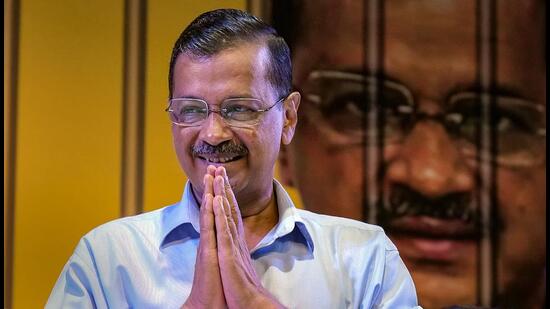
Chief Minister Arvind Kejriwal of Delhi was granted bail by the Supreme Court on Friday in the corruption case involving the excise policy’scam’. Kejriwal received the relief on a bail bond of Rs. 10 lakh and two sureties, as decided by a bench of Justices Surya Kant and Ujjal Bhuyan. Kejriwal was ordered by the highest court to refrain from addressing the case’s merits in public.
Justice Bhuyan also noted that, similar to Caesar’s wife, the CBI needs to be above suspicion when conducting investigations and take action to dispel the impression that it is a caged parrot.
Why did the Supreme Court grant Arvind Kejriwal bail?
1.The Supreme Court declared, “there is no impediment in arresting a person already in custody,”. Notably, Kejriwal was detained by the CBI during his judicial detention.
Justice Bhuyan stated, “It appears only after TC granted regular bail to appellant in ED case, that CBI became active and sought custody.” “It [the CBI] didn’t feel the need to arrest for over 22 months,” he continued. A major question about arrest itself is raised by such an action.
In the September 5 Supreme Court hearing, Kejriwal’s attorney, Abhishek Singhvi, claimed that the CBI failed to apprehend the Delhi chief minister for almost two years in connection with the purported excise policy scandal.
After being granted bail in the “harsher” money laundering case brought by the Enforcement Directorate (ED), Singhvi had claimed that a “insurance arrest” had been made on June 26. While Kejriwal was still being held, the CBI nabbed him on June 26 after the ED had arrested him on March 24 of this year.
According to Singhvi, Kejriwal was detained by the CBI between May 10, when he was given bail for the Lok Sabha elections, and the July 12 ruling of the Supreme Court. On June 2, Kejriwal was back in jail; the next ruling was due on July 12. On July 12, the Supreme Court granted Kejriwal provisional bail in the money laundering case.
The lawyer was cited by Bar and Bench as stating, “Then, on June 25, this arrest took place in the CBI case even though no arrest ever happened in three years.”
Among the judges who delivered the decision on Friday was Justice Surya Kant, who stated, “We have noted that the CBI, in their application, recorded reasons as to why they deemed it necessary.” No S.41A(iii) violation has occurred.
2.The Supreme Court determined that Kejriwal “satisfies [triple] test for bail” after noting that it is unlikely for the trial to be completed “in the immediate future.”The “CBI’s appearance raises more questions than it answers,” according to Justice Bhuyan in the interim.
According to the court, three questions have been formulated in light of arguments. We’ve formulated three enquiries. Judges Surya Kant were described by Live Law as questioning “whether there was illegality in the arrest, whether appellant should be allowed regular bail, and whether filing of chargesheet is change in circumstance enough to relegate to TC.”
